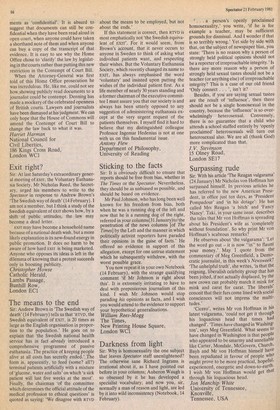The means to the end
Sir: Andrew Brown in 'The Swedish way of death' (14 February) tells us that `RTVD, the Swedish equivalent of EXIT, is 20 times as large as the English organisation in proportion to the population.' He goes on to explain that `the Swedish national health service has in fact already introduced a comprehensive programme of passive euthanasia. The practice of keeping people alive at all costs has secretly ended.' The form is, apparently, to feed (some? all?) terminal patients artificially with a mixture of 'glucose, water and salts' on which `a sick patient will last five weeks at the most'. Finally, the chairman 'of the committee which determines the official attitude of the medical profession to ethical questions' is quoted as saying: 'We disagree with RTVD about the means to be employed, but not about the ends.'
If this statement is correct, then RIND is most emphatically not 'the Swedish equivalent of EXIT'. For it would seem, from Brown's account, that it never occurs to anyone in Sweden to think of asking what individual patients want, and respecting their wishes. But the Voluntary Euthanasia Society, which recently changed its name to EXIT, has always emphasised the word 'voluntary' and insisted upon putting the wishes of the individual patient first. As a life member of nearly 30 years standing and a former chairman of the executive committee I must assure you that our society is and always has been utterly opposed to any suggestion of administering euthanasia except at the very urgent request of the patients themselves. I myself find it hard to believe that my distinguished colleague Professor Ingemar Hedenius is not at one with us on this fundamental issue.
Antony Flew Department of Philosophy, University of Reading






































 Previous page
Previous page